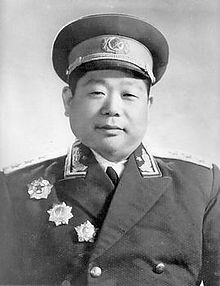Chen Xilian | |
|---|---|
 | |
| Birth name | Chen Xilian |
| Born | January 1, 1915 Hong'an County, Hubei, Republic of China |
| Died | 10 June 1999 (aged 84) Beijing, China |
| Allegiance | |
| Service | People's Liberation Army |
| Rank | General |
| Commands | 129th Division Eighth Route Army 385th Brigade Shenyang Military Region Beijing Military Region |
| Battles / wars | Chinese Civil War Second Sino-Japanese War Sino-Soviet border conflict |
| Awards | |
| Spouse(s) | Li Ge
(m. 1942; died 1948)Wang Xuanmei (1949–1999) |
| Children | 3 (two sons and one daughter) |
| Chen Xilian | |||||||
|---|---|---|---|---|---|---|---|
| Simplified Chinese | 陈锡联 | ||||||
| Traditional Chinese | 陳錫聯 | ||||||
| |||||||
Chen Xilian (pronounced [ʈʂʰə̌n ɕíljɛ̌n]; 4 January 1915 – 10 June 1999) was a Chinese military officer and politician, general of the People's Liberation Army. A prominent Maoist, he held very important positions in both military and political spheres.[1]
Following acclaimed participation in many battles during both the Second Sino–Japanese War and the Chinese Civil War, Chen served as Mayor and Military Governor of Chongqing from 1949 to 1950 and Central Commander of PLA Artillery from 1950 to 1959. He then commanded the Shenyang Military Region (1959–73) and, crucially, the Beijing Military Region (1973–80). Additionally, Chen was a full member of the Politburo (1969–80) and Vice Premier (1975–80).[2]
After Mao's death, Chen was one of Hua Guofeng's most significant supporters, along with Wang Dongxing and Li Xiannian. When Deng Xiaoping gradually rose to power, Chen lost his powerful posts, but was allowed to retire without harm.